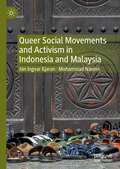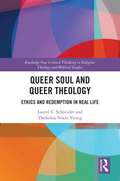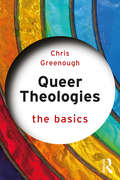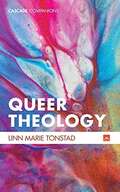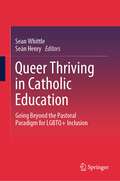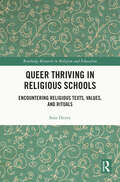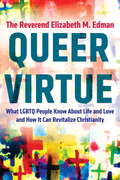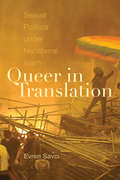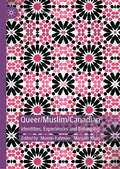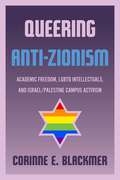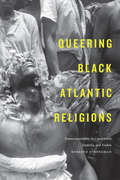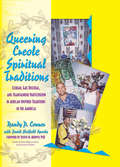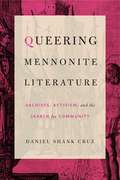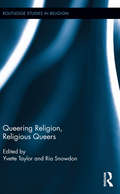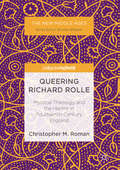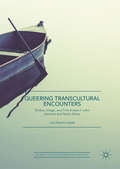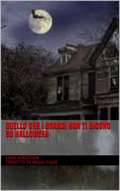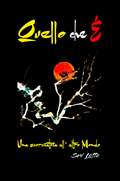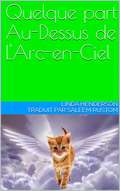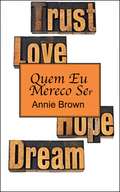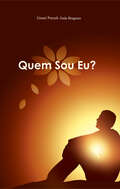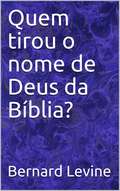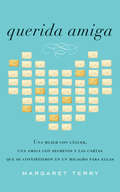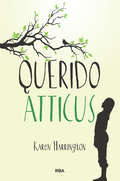- Table View
- List View
Queer Social Movements and Activism in Indonesia and Malaysia
by Jón Ingvar Kjaran Mohammad NaeimiThis book examines queer activism and queer social movements (QSMs) in Indonesia and Malaysia, broadly engaging with these topics on three different levels: macro (global and national discourses), meso (organizational level – activities), and micro (individual – the activist). The micro level perspective allows for moving beyond the “traditional” political movement paradigm by understanding activism in Foucauldian terms as the ethics of the self (Foucault, 1984). In other words, the queer subject is seen as an active agent in taking care of the self by queering/resisting gender norms as well as heteronormative practices and regimes in their social environment through embodiment and actions. This kind of ethical being has the potential to build support and community between and amongst individuals.
Queer Soul and Queer Theology: Ethics and Redemption in Real Life (Routledge New Critical Thinking in Religion, Theology and Biblical Studies)
by Thelathia Nikki Young Laurel C. SchneiderThis book takes up the question of Christian queer theology and ethics through the contested lens of "redemption." Starting from the root verb "to deem," the authors argue that queer lives and struggles can illuminate and re-value the richness of embodied experience that is implied in Christian incarnational theology and ethics. Offering a set of virtues gleaned from contemporary lesbian, gay, bisexual, transgender, intersex, queer, and asexual (LGBTIQA) lives and communities, this book introduces a new framework of ethical reasoning. Battered and wrongly condemned by life-denying theologies of redemption and dessicating ethics of virtue, this book asserts that the resilience, creativity, and epistemology manifesting in queer lives and communities are essential to a more generous and liberative Christian theology. In this book, queer "virtues" not only reveal and re-value queer soul but expose covert viciousness in the traditional (i.e., inherently colonial and racist, and thus ungodly) "family values" of dominant Christian ethics and theology. It argues that such re-imagining has redemptive potential for Christian life writ large, including the redemption of God. This book will be a key resource for scholars of queer theology and ethics as well as queer theory, gender and race studies, religious studies, and theology more generally.
Queer Theologies: The Basics (The Basics)
by Chris GreenoughQueer Theologies: The Basics is a concise and illuminating introduction to the study of this controversial and discursive subject area. This book provides an accessible exploration into the major themes within queer studies, queer theologies, and themes of gender and sexuality in Christianity. Topics covered include: The development of queer theologies Queering ‘traditional’ theology Queer theologies in global contexts Queer Bible Queer theologies from queer lives With a glossary of key terms and suggestions for further reading throughout, this book is an ideal starting point for anyone seeking a full introduction to Christian queer theologies as well as broader themes in theology, gender, and sexuality.
Queer Theology: Beyond Apologetics (Cascade Companions Series)
by Linn Marie TonstadWhat do Christianity and queerness have to do with each other? Can Christianity be queered? Queer Theology offers a readable introduction to a difficult debate. Summarizing the various apologetic arguments for the inclusion of queer people in Christianity, Tonstad moves beyond inclusion to argue for a queer theology that builds on the interconnection of theology with sex and money. Thoroughly grounded in queer theory as well as in Christian theology, Queer Theology grapples with the fundamental challenges of the body, sex, and death, as these are where queerness and Christianity find (and, maybe, lose) each other.
Queer Thriving in Catholic Education: Going Beyond the Pastoral Paradigm for LGBTQ+ Inclusion
by Sean Whittle Seán HenryThis book provides readers with the opportunity to go beyond anecdote and supposition in order to get a fuller grasp of research around Catholic education and LGBTQ+ matters. This is an edited collection of chapters which explores LGBTQ+ matters in relation to Catholic education. Although the field of Catholic Education Studies has grown exponentially over the past two decades, little if any attention has been published specifically about the place of LGBTQ+ students (and teachers) in the context of Catholic education. This edited book presents the various strands of research about Catholic education and LGBTQ+ inclusion. More specifically, this edited book of chapters addresses a number of broader themes including:• Is it possible for Catholic education to sit in harmony with the concerns of LGBTQ+ inclusive education?• What does it mean to ‘queer’ education at all? How does this sit in relation to Catholic perspectives on the purpose of Catholic education?• When it comes to LGBTQ+ issues in relation to Catholic education, what is the research agenda?• How might Catholic schools move beyond a ‘pastoral accommodation’ approach to LGBTQ+ students?• What does the evidence from research in Catholic schools indicate? Are they places of inclusion, hospitality, and welcome for LGBTQ+ young people?
Queer Thriving in Religious Schools: Encountering Religious Texts, Values, and Rituals (Routledge Research in Religion and Education)
by Seán HenryThis book offers an account of religious schooling committed to ‘queer-thriving’ and envisions how queer staff and students can live their lives without being ‘accommodated’ within heteronormative religious traditions.Engaging with queer theological perspectives across the Jewish, Christian, and Muslim traditions, the book begins by situating queer thriving as a viable part of the work of the religious school, and not just as something reserved for progressive education more broadly. Taking three areas that are typically used to justify religious heteronormativity (religious texts, religious values, religious rituals), it engages queer theologies to showcase how an educational approach committed to queer thriving can be enacted in religious schools in ways that are also theologically sensitive. The book then explores how religious school communities can navigate differences around queerness and religion in ways that are supportive of queer staff and students. It takes desire as an everyday reality in classrooms and applies a queer lens to this to challenge heteronormativity and to imagine alternative modes of relationship between staff, students, and communities that enable queer staff and students to thrive.Showcasing possibilities of resistance for the opposition between religious and queer concerns, it will appeal to researchers, postgraduates and academics in the fields of religion and education, whilst also benefitting those working across philosophy of education and educational theory, sex education, sociology of education, social justice education, queer theologies, religious studies, and sociology of religion.
Queer Virtue: What LGBTQ People Know About Life and Love and How It Can Revitalize Christianity
by Rev Elizabeth M. EdmanLGBTQ people are a gift to the Church and have the potential to revitalize Christianity.As an openly lesbian Episcopal priest and professional advocate for LGBTQ justice, the Reverend Elizabeth Edman has spent her career grappling with the core tenets of her faith. After deep reflection on her tradition, Edman is struck by the realization that her queer identity has taught her more about how to be a good Christian than the church.In Queer Virtue, Edman posits that Christianity, at its scriptural core, incessantly challenges its adherents to rupture false binaries, to "queer" lines that pit people against one another. Thus, Edman asserts that Christianity, far from being hostile to queer people, is itself inherently queer. Arguing from the heart of scripture, she reveals how queering Christianity--that is, disrupting simplistic ways of thinking about self and other--can illuminate contemporary Christian faith. Pushing well past the notion that "Christian love = tolerance," Edman offers a bold alternative: the recognition that queer people can help Christians better understand their fundamental calling and the creation of sacred space where LGBTQ Christians are seen as gifts to the church.By bringing queer ethics and Christian theology into conversation, Edman also shows how the realities of queer life demand a lived response of high moral caliber--one that resonates with the ethical path laid down by Christianity. Lively and impassioned, Edman proposes that queer experience be celebrated as inherently valuable, ethically virtuous, and illuminating the sacred.A rich and nuanced exploration, Queer Virtue mines the depths of Christianity's history, mission, and core theological premises to call all Christians to a more authentic and robust understanding of their faith.
Queer in Translation: Sexual Politics under Neoliberal Islam (Perverse Modernities: A Series Edited by Jack Halberstam and Lisa Lowe)
by Evren SavciIn Queer in Translation, Evren Savcı analyzes the travel and translation of Western LGBT political terminology to Turkey in order to illuminate how sexual politics have unfolded under Recep Tayyip Erdoğan's AKP government. Under the AKP's neoliberal Islamic regime, Savcı shows, there has been a stark shift from a politics of multicultural inclusion to one of securitized authoritarianism. Drawing from ethnographic work with queer activist groups to understand how discourses of sexuality travel and are taken up in political discourse, Savcı traces the intersection of queerness, Islam, and neoliberal governance within new and complex regimes of morality. Savcı turns to translation as a queer methodology to think Islam and neoliberalism together and to evade the limiting binaries of traditional/modern, authentic/colonial, global/local, and East/West—thereby opening up ways of understanding the social movements and political discourse that coalesce around sexual liberation in ways that do justice to the complexities both of what circulates under the signifier Islam and of sexual political movements in Muslim-majority countries.
Queer/Muslim/Canadian: Identities, Experiences and Belonging (Global Queer Politics)
by Momin Rahman Maryam KhanThis book presents original qualitative research on the lives, identities, and experiences of queer Canadian Muslims and is the largest study to date on this population. Presented through a queer intersectional framework, the volume contains core evidence-based chapters on the lived experience, as well as the transnational politics of Islamophobia and LGBTQ+ rights promotion, the research on Muslim attitudes to queer issues, and the representations of queer Muslim issues within Canada. Key issues covered include: queer Muslim organizing, how queer Muslims reconcile faith, sexuality and gender identity through affirmative and liberatory frameworks and actions, how Muslims in Canada respond to sexual and gender diversity. The contributors also lay out future academic and research possibilities for further investigation and for the development of equity practices for recognizing and challenging the oppressions suffered by queer Muslims, addressing the discussion to queer Muslims as well as mainstream LGBTQ+ groups and mainstream Muslim groups.
Queering Anti-Zionism: Academic Freedom, LGBTQ Intellectuals, and Israel/Palestine Campus Activism
by Corinne E. BlackmerWith engaged scholarship and an exciting contribution to the field of Israel/Palestine studies, queer scholar-activist Corinne Blackmer stages a pointed critique of scholars whose anti-Israel bias pervades their activism as well as their academic work. Blackmer demonstrates how the Boycott, Divestment, and Sanctions (BDS) movement that seeks to delegitimize and isolate Israel has become a central part of social justice advocacy on campus, particularly within gender and sexuality studies programs. The chapters focus on the intellectual work of Sarah Schulman, Jasbir Puar, Angela Davis, Dean Spade, and Judith Butler, demonstrating how they misapply critical theory in their discussions of the State of Israel. Blackmer shows how these LGBTQ intellectuals mobilize queer theory and intersectionality to support the BDS movement at the expense of academic freedom and open discourse.
Queering Black Atlantic Religions: Transcorporeality in Candomblé, Santería, and Vodou (Religious Cultures of African and African Diaspora People)
by Roberto StrongmanIn Queering Black Atlantic Religions Roberto Strongman examines Haitian Vodou, Cuban Lucumí/Santería, and Brazilian Candomblé to demonstrate how religious rituals of trance possession allow humans to understand themselves as embodiments of the divine. In these rituals, the commingling of humans and the divine produces gender identities that are independent of biological sex. As opposed to the Cartesian view of the spirit as locked within the body, the body in Afro-diasporic religions is an open receptacle. Showing how trance possession is a primary aspect of almost all Afro-diasporic cultural production, Strongman articulates transcorporeality as a black, trans-Atlantic understanding of the human psyche, soul, and gender as multiple, removable, and external to the body.
Queering Creole Spiritual Traditions: Lesbian, Gay, Bisexual, and Transgender Participation in African-Inspired Traditions in the Americas
by David Sparks Randy P Lundschien ConnerWhat roles do queer and transgender people play in the African diasporic religions? Queering Creole Spiritual Traditions: Lesbian, Gay, Bisexual, and Transgender Participation in African-Inspired Traditions in the Americas is a groundbreaking scholarly exploration of this long-neglected subject. It offers clear insight into the complex dynamics of gender and sexual orientation, humans and deities, and race and ethnicity, within these richly nuanced spiritual practices. Queering Creole Spiritual Traditions explores the ways in which gender complexity and same-sex intimacy are integral to the primary beliefs and practices of these faiths. It begins with a comprehensive overview of Vodou, Santeria, and other African-based religions. The second section includes extensive, revealing interviews with practitioners who offer insight into the intersection of their beliefs, their sexual orientation, and their gender identity. Finally, it provides a powerful analysis of the ways these traditions have inspired artists, musicians, and writers such as Audre Lorde, as well as informative interviews with the artists themselves. In Queering Creole Spiritual Traditions, you will discover: how the presence of androgynous divinities affects both faith and practice in Vodou, Candomble, Santeria, and other Creole religions how the phenomenon of possession or embodiment by a god or goddess may validate queer identity and nurture gender complexity who practices the African-derived spiritual traditions, what they believe, and who their deities are how these faiths have influenced the art and aesthetic traditions of the West This landmark book opens a fascinating new world of thought and belief. The authors provide rigorous documentation and faultless scholarly method as well as personal experience and the testimony of believers. Queering Creole Spiritual Traditions sheds new light on two widely different fields: LGBT studies and the theology of the African diaspora. A thorough bibliography points the way to further study, and an extensive photograph gallery provides a unique look at the believers and their practices. Every library with holdings in queer theory, African mythology, or sociology of religion should have this landmark volume.
Queering Mennonite Literature: Archives, Activism, and the Search for Community
by Daniel Shank CruzThough the terms “queer” and “Mennonite” rarely come into theoretical or cultural contact, over the last several decades writers and scholars in the United States and Canada have built a body of queer Mennonite literature that shifts these identities into conversation. In this volume, Daniel Shank Cruz brings this growing genre into a critical focus, bridging the gaps between queer theory, literary criticism, and Mennonite literature.Cruz focuses his analysis on recent Mennonite-authored literary texts that espouse queer theoretical principles, including Christina Penner’s Widows of Hamilton House, Wes Funk’s Wes Side Story, and Sofia Samatar’s Tender. These works argue for the existence of a “queer Mennonite” identity on the basis of shared values: a commitment to social justice, a rejection of binaries, the importance of creative approaches to conflict resolution, and the practice of mutual aid, especially in resisting oppression. Through his analysis, Cruz encourages those engaging with both Mennonite and queer literary criticism to explore the opportunity for conversation and overlap between the two fields.By arguing for engagement between these two identities and highlighting the aspects of Mennonitism that are inherently “queer,” Cruz gives much-needed attention to an emerging subfield of Mennonite literature. This volume makes a new and important intervention into the fields of queer theory, literary studies, Mennonite studies, and religious studies.
Queering Mennonite Literature: Archives, Activism, and the Search for Community
by Daniel Shank CruzThough the terms “queer” and “Mennonite” rarely come into theoretical or cultural contact, over the last several decades writers and scholars in the United States and Canada have built a body of queer Mennonite literature that shifts these identities into conversation. In this volume, Daniel Shank Cruz brings this growing genre into a critical focus, bridging the gaps between queer theory, literary criticism, and Mennonite literature.Cruz focuses his analysis on recent Mennonite-authored literary texts that espouse queer theoretical principles, including Christina Penner’s Widows of Hamilton House, Wes Funk’s Wes Side Story, and Sofia Samatar’s Tender. These works argue for the existence of a “queer Mennonite” identity on the basis of shared values: a commitment to social justice, a rejection of binaries, the importance of creative approaches to conflict resolution, and the practice of mutual aid, especially in resisting oppression. Through his analysis, Cruz encourages those engaging with both Mennonite and queer literary criticism to explore the opportunity for conversation and overlap between the two fields.By arguing for engagement between these two identities and highlighting the aspects of Mennonitism that are inherently “queer,” Cruz gives much-needed attention to an emerging subfield of Mennonite literature. This volume makes a new and important intervention into the fields of queer theory, literary studies, Mennonite studies, and religious studies.
Queering Religion, Religious Queers: Queering Religion, Religious Queers (Routledge Studies in Religion)
by Yvette Taylor Ria SnowdonThis collection considers how religious identity interplays with other forms and contexts of identity, specifically those related to sexual identity. It asks how these intersections are formed, negotiated and resisted across time and places, including the UK, Europe, North America, Australia, and the Global South. Questions around ‘queer’ engagements in same-sex marriages, civil partnerships and other practices (e.g. adoption) have created a number of provoking stances and policy provisions – but what remains unanswered is how people experience and situate themselves within sometimes competing, or ‘contradictory’, moments as ‘religious queers’ who may be tasked with ‘queering religion’. Additionally, the presumed paradoxes of ‘marriage’, queer sexuality, religion and youth combine to generate a noteworthy generational absence. This leads to questions about where ‘religious queers’ reside, resist and relate experiences of intersecting religious and sexual lives. In looking at interconnectedness, this collection offers international contributions which bridge the ‘contradictions’ in queering religion and in making visible ‘religious queers.’ It provides insight into older and younger people’s understandings of religiosity, queer cultures, and religious groups. A small but active religious minority in the US has received much attention for its anti-gay political activity; much less attention has been paid to the more positive, supportive role that religious-based groups play in e.g. providing housing, education and political advocacy for queer youth. Queer methodologies and intersectional approaches offer a lens both theoretically and methodologically to uncover the salience of related social divisions and identities. This collection is both innovative and sensitive to ‘blended’ identities and their various enactments.
Queering Richard Rolle
by Christopher M. RomanThis book examines three aspects of Rolle's thinking used throughout this work: his ontology, phenomenology, and sound ecology. These facets of his work invoke both a way of understanding being in the world, an opening up of the body in queer ways to experience the divine, and a way to consider divine contemplation in terms of singing the body. Queering Richard Rolle considers how Rolle navigates queer, eremitic conduct in order to create an identity always in process
Queering Transcultural Encounters: Bodies, Image, and Frenchness in Latin America and North Africa (Palgrave Studies in Globalization and Embodiment)
by Luis Navarro-AyalaIn a highly original and interdisciplinary work bridging French and Francophone studies, cultural studies, media studies, and gender and sexuality studies, Luis Navarro-Ayala examines the transnational queer body as a physical and symbolic entity intrinsically connected with space. Through a transcultural and intersectional approach to bodily representations, socioeconomic conditions, and postcolonial politics, Navarro-Ayala analyzes queerness and Frenchness in narratives from North Africa and Latin America, revealing that Frenchness is coded to represent a sexually deviant “Other.” France and Frenchness, in two distinct regions of the global South, have come to represent an imagined queer space enabling sexual exploration, even in social conditions that would have otherwise prevented queer agency.
Quello Che I Grandi Non Ti Dicono Su Halloween
by Linda HendersonÈ divertente travestirsi con costumi spaventosi e fare dolcetto o scherzetto per Halloween, giusto? Presta attenzione alla storia vera di "Bill", che ha trovato più di quanto si aspettasse giocando con una tavola Ouija con la sua ragazza. Puoi anche scoprire da dove viene "Halloween". Cosa ti porterà più felicità di spaventarsi o mangiare caramelle gratis? Leggerai tutto ciò in questo libro!
Quello che É - Una scorciatoia all' Altro Mondo
by Sri Lotte Bruno LandisReminescenze zen, sufi, taoiste, della corrente advaita del vedanta, del monacato contemplativo cristiano, del misticismo renano e degli eremiti filocalici; sí, tutti questi aromi sono presenti nelle pagine di questo breve messaggio. Pitagorismo, un po’ di neoplatonismo e buddismo primitivo, non possono essere negati nel loro messaggio. Condimenti esseni e qualcosa dei misteri orfici vengono alla superficie, e inoltre si troveranno terminologie moderne relative alla tecnologia scientifica e biologica. Si potrebbe supporre che un ecletticismo tale possa provocare una confusione poco digeribile. Invece non é cosí. Il testo abbonda in chiarezza, sintesi e premura per raggiungere il nocciolo della questione. Se qualche paragrafo dovesse rimanere difficile ad una prima lettura, basterá rileggerlo perché diventi trasparente. Il testo richiede solo un poco di attenzione: ció che dice é semplicemente quello che dice. Peró, cosa dice il testo circa “QUELLO”? Dice che stiamo vivendo in maniera erronea, assolutamente sbagliata. Che non siamo quello che crediamo e sembriamo essere. Che non esiste la morte e neppure la materia. Che l”altro mondo” si interseca con questo e che é il solo Reale. Non dice solamente questo ma indica anche, con una precisione da chirurgo, quello che si puó “fare” per vivere lá, nella vera casa, che in fondo non é che “qui”. Se aggiungo altro, finisce che la prefazione diventa piú lunga dl libro, cosa che comunque faccio nell’aggiungere commenti e note alla fine di ogni capitolo. Spero che tutto ció non pregiudichi il messagio vero e proprio. L’autore preferisce rimanere anonimo: sostiene che porre il suo nome sarebbe come aggiudicarsi un titolo che non gli spetta. Questo non perché si pensi che le parole gli siano state sussurrate da qualche divinitá o per avere un canale diretto con i misteri akasici, invece perché riconosce que “QUELLO” gli é capitato, cosí
Quelque part Au-Dessus de L'Arc-en-Ciel
by Linda HendersonLes animaux que vous avez aimés et soignés vont-ils au paradis quand ils meurent? «Quelque part au-dessus de l'arc-en-ciel» donne aux enfants l'espoir de pouvoir revoir leurs animaux de compagnie après leur mort. Il est basé sur la vérité biblique et les révélations données au peuple de Dieu. Si vous connaissez un enfant dont l'animal est mort, ce livre pourrait leur apporter un grand réconfort!
Quem Eu Mereço Ser
by Annie Brown Poliana DantasTendo vivido em diversas comunidades, Annie se tornou hábil (capacitou) em observar e tomar a iniciativa em várias conversas sobre o que as pessoas pensam delas mesmas. Ela observou que existem muitos homens, mulheres, meninos e meninas confiantes; no entanto, existem também muitos indivíduos que sofrem de baixa autoestima, e nunca estão satisfeitos consigo mesmos, não importa o que tenham conquistado. Parece haver uma busca para se tornar o que a sociedade projeta como normas aceitáveis; contudo, tais normas são diferentes de acordo com cada cultura e etnia. Cada indivíduo precisa explorar quem eles são e o que Deus quer que eles sejam enquanto fazem sua jornada pela vida. "Quem Eu Mereço Ser" é sobre a contemplação de quem nós somos, em oposição ao que nós pensamos que precisamos ser. A decisão de quem você será é sua, de modo que você pode levar uma vida feliz e produtiva, e não gastando horas inúteis tentando ser quem você entende que será popular com os outros.
Quem Sou Eu?
by Dada BhagwanExiste um Deus? O que é Deus? Quem é o que 'faz' no mundo? E o que Deus faz ou não? Qual é a verdadeira natureza de Deus? Qual é a natureza do que realmente " faz '' neste mundo? Quem comanda o mundo? Como isso funciona? Qual é a verdadeira natureza da ilusão? O que quer que se saiba é real ou ilusão? A pessoa se torna livre ou permanece ligada ao conhecimento que tem? Este livro vai lhe dar o preciso entendimento da verdade por trás dessas perguntas. Além disso, o leitor destas páginas é apresentado à essência do Akram Vignan (o caminho direto para a libertação da Alma).
Quem tirou o nome de Deus da Bíblia?
by Bernard Levine Viviane MeloQuando Jesus nos ensinou a orar, ele disse: Pai Nosso que estais no céu Santificado seja o seu nome... Que nome? É “Deus?”... Esse não é o nome dele... é um título. O nome “Lorde?”... Não é o nome dele... Também é um título. Qual é o nome sagrado pessoal do deus que você serve? Por que é importante usar e louvar o verdadeiro nome de Deus? Você viu o que está escrito em Apocalipse capítulo 14: versículo 1? E também no Apocalipse capítulo 3? Você sabia que uma das principais razões pelas quais, Jesus veio a esta terra foi com o propósito de revelar e fazer conhecer o santo nome de Seu Pai. Neste livro, você descobrirá a verdadeira identidade do Deus de Israel que a maioria dos cristãos não conhece.
Querida amiga
by Margaret TerryQuerida amiga nos enseña cómo dos mujeres comunes descubrieron los milagros de la esperanza, el amor y la amistad.¿Qué le dices a una amiga a la que le quedan pocos meses de vida? El día en que Deb dio a conocer que tenía un cáncer de pulmón inoperable, la escritora Margaret Terry aceptó enviarle unas palabras motivadoras y hacer algo que nunca había hecho: creer en los milagros. Margaret buscó detenidamente en el pozo de su propia vida una motivación con la que Deb pudiera identificarse. Le escribió sobre cosas que podrían haber compartido si tuvieran más tiempo e historias secretas de vulnerabilidad y pérdida, de amor y perdón. Querida amiga muestra el poder de una buena historia contada con un corazón abierto y fiel. Los lectores se identificarán con sus amores y pérdidas, sus esperanzas y sueños, y volverán a sentir un vínculo con la maravilla de los milagros cotidianos. Querida amiga es una celebración a la vida aun cuando todo esté en contra.
Querido Atticus
by Karen HarringtonEsta es la historia del extraordinario verano en el que Sarah Nelson consigue su primer amor verdadero, nuevos amigos, y las respuestas que siempre ha estado buscando. Seguro que nunca has conocido a nadie como Sarah Nelson. Mientras que sus amigos se obsesionan con Harry Potter, ella pasa el tiempo escribiendo cartas a Atticus Finch y recogiendo palabras problemáticas en su diario. Mantiene una gran amistad con Planta y no conoce a su madre, que se fue cuando ella tenía dos años. Desde entonces, Sarah se ha mudado de ciudad en ciudad con su problemático padre y nunca ha tenido un hogar fijo. Sin embargo, todo cambia cuando elude la visita a los abuelos en vacaciones e inicia una investigación sobre el gran secreto de su familia. En lugar del «típico verano aburrido de Sarah Nelson», este veranos podría resultar... un verano extraordinario.
